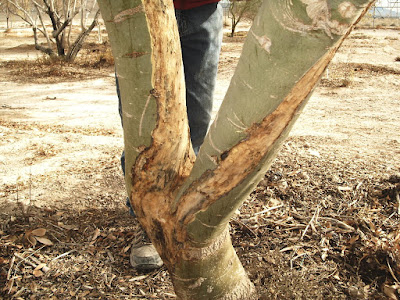Q. The branches of my Palo
Verde are turning brown and dying. I have lost one tree and looks
like two others will die
as well. They are 25 years old.
A. It is difficult to diagnose without more information.
If branches are dying in Palo Verde during the heat, my mind instantly goes
towards borers. The Palo Verde borer that feeds on the roots is a possibility.
 |
| Flatheaded Borer in palo verde limbs due to sunburn. Pruning too much can cause severe sunburn on the branches. |
It is possible it could be other borers in the tree, such
as some of the flat headed borers, but individual branches dying is frequently
associated with borers of some sort. If you think borers might be the problem,
apply a soil drench insecticide around the base of the tree and water it in.
 |
| Flatheaded borer in palo verde. Be careful when you prune. |
It is also possible to be water related such as keeping
the soil around roots too wet. If the irrigation has been changed recently or
there was an irrigation problem, too much water might be the culprit. Desert
trees like Palo Verde perform very well when there is more time between
irrigations compared to landscape trees like ash or even Chitalpa.
It could be pruning related. If trees were recently
pruned hard this past winter or spring, there is a possibility of sunburn
damage to the limbs. The limbs would be discolored or brown on the top surface
facing the sunlight. Sunburn damage frequently attracts boring insects.
Make sure the tree is watered deeply but infrequently.
Water applied to the soil should wet most of the area under the tree, not just
close to the trunk. This water should drain into the soil 18 inches or more.Hopefully it will heal on its own. Be careful of pruning.
Wet soil is soft. Dry soil is hard. Use a long
screwdriver or 3/8-inch rebar poked in the soil to determine how deep the water
has moved into the soil after the irrigation.
This tree should not require
an irrigation for a week if it’s watered deeply. When the soil around the roots
becomes dry, this tree will start dropping its leaves. This is your signal it’s
time to water again.
No comments:
Post a Comment